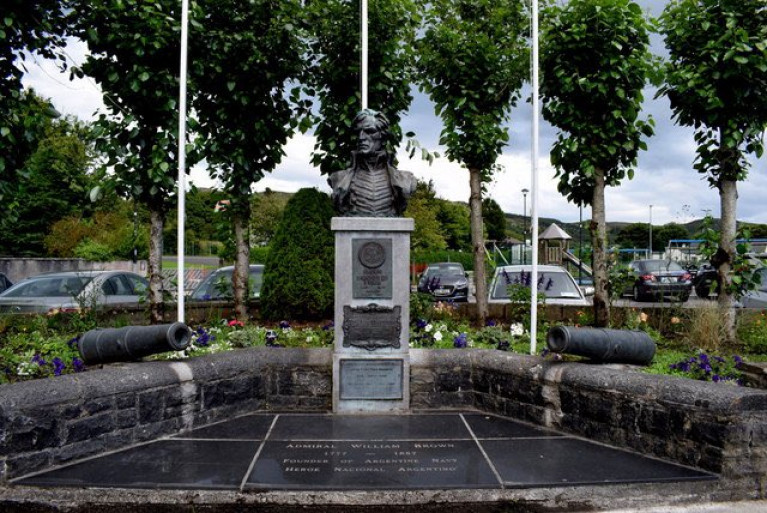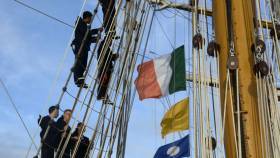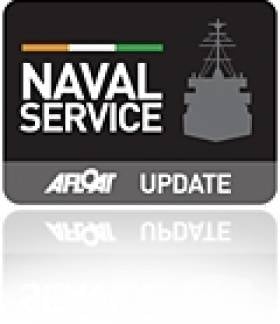Displaying items by tag: Admiral William Brown
Admiral Brown Museum, Mayo Closes Due to Lack of Funding
It has been expressed with regret the closure in Foxford, Co. Mayo of the Admiral Brown Memorial Museum.
As the Connacht Telegraph writes, the closure is due to lack of funding and which has been met with dismay both locally and in Argentina, where close links have been forged over many years through the work of the Admiral William Brown Society.
Admiral Brown founded the Argentine Navy (see: 2019 museum visit) and one group there - the Asociación Argentino Irlandesa - has appealed to the Irish and Argentine authorities to come up with a solution.
Over the weekend, the Foxford-based Admiral William Brown Society explained how funding has been an issue in keeping the centre open, but they hope it can be reviewed with support.
More here on the story.
Argentinian Navy School Tallship Sails In On Bicentenary
#AdmiralBrown - Argentinian Navy school tallship, ARA Libertad is docked in Dublin Port for a four day visit, to highlight the historical connections between the south American country and Ireland, writes Jehan Ashmore.
The naval cadet sail training vessel, designated as a 'frigate' for midshipmen and women, has visited the capital before, is berthed along Sir John Rogersons Quay. At the quayside is a statue dedicated to Admiral William Brown, the Irishman born in Foxford, Co Mayo, who founded the Argentinian Navy.
ARA Libertad’s visit on this occasion is special, as 2016 marks the 200th anniversary of Argentinean independence. The three masted tallship is on world voyage and has been called by the navy ‘the bicentennial journey’.
In total the world voyage is to take 196 days, and calling to ports in Brazil, USA, the Netherlands, France and the UK, from where her most recent leg from Liverpool was completed yesterday. The tallship is open to tours until this Sunday, the same day in which the vessel is due to depart.
Homage Paid to Irish Founder of Argentinian Navy
#ADMIRAL BROWN- As Wexford is to host The John Barry Maritime Festival this summer, the father of the US Navy and commodore is held in the same league of Admiral William Brown, who founded the Argentinian Navy, who was remembered in a ceremony over the weekend in Buenos Aires, writes Jehan Ashmore.
The commemoration was to mark the 155th anniversary of William Brown's passing which took place at the Recoleta Cemetery, which was headed by Vice Admiral Carlos Alberto Paz, Chief of Staff of the Argentine Navy.
Among those attending were the Irish Ambassador, Mr. James McIntyre, the Chairman of the National Brownian Institute, Prof. Emilia Menotti, the President of the Naval Club, Vice Admiral Eduardo R. Llambi (Ret.) and City Council Officials.
The Navy General Directorate for Education marching band was also present, as well as Officer Cadets from the Admiral Brown Naval Lyceum (Reserve Officers' Academy). The Irish flag was carried alongside the host country by officers of the HQ Security Marine Bn.
For more about the event which included Santiago L. Aversa who represented the Irish branch of the Maritime Institute of Ireland (click HERE) and where its maritime museum in Dun Laoghaire is due to reopen early next month as previously reported on Afloat.ie
In 2006 the Naval Service 'flagship' L.É. Eithne (whose adopted homeport is Dun Laoghaire) under the command of Commodore Mark Mellett, made a historic first for the Naval Service when visiting Argentina and other South American ports.
In the same year two identical statues of the admiral were unveiled, one in Dublin's Docklands at Admiral Brown Way and Westport, Co. Mayo where the admiral hailed from.
Admiral Brown won victories against the Spanish and Brazilian fleets and as such he is regarded as a national hero, where in excess of 1,000 streets, 400 statues and venues such as stadiums (including football teams) schools, several towns, and a major city bears his name.
- naval service
- Argentinian Navy
- L.E. Eithne
- Commodore John Barry
- Admiral William Brown
- Commodore Mark Mellett
- M.I.I.
- Maritime Institute of Ireland
- Mariners Church Dun Laoghaire
- Maritime Museum Dun Laoghaire
- Dublin Docklands
- The John Barry Maritime Festival
- Admiral Brown Way
- Irish Ambassador McIntyre
- Westport Co Mayo
- Wexford Town































































